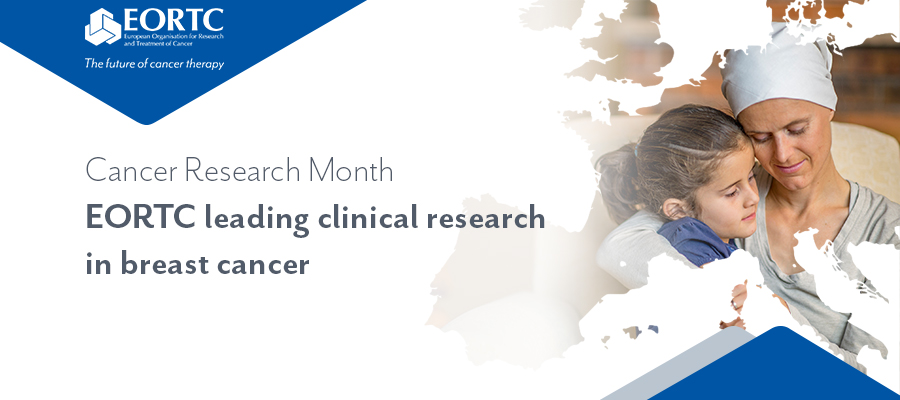Cancer Research Month: EORTC leading clinical research in breast cancer
18 May 2018
EORTC has conducted a number of groundbreaking studies in its 52-year history. One of most notable studies in cancer research in recent years has been the MINDACT trial.
The MINDACT1 (Microarray in Node-negative and 1 to 3 positive lymph node Disease may Avoid ChemoTherapy) study, which was a partnership between EORTC Breast Cancer Group, Breast International Group (BIG) and the transBIG consortium. More than 6,600 patients in 104 institutions across nine countries were enrolled from February 2007 to July 2011 in this trial. MINDACT was the largest European randomized prospective trial evaluating the clinical value of a genomic profile for risk assessment and adjuvant chemotherapy prescription for breast cancer. The trial’s complex logistics, including real-time collection of frozen tumour tissue, were proven feasible in a multinational, multicentre setting. Patients with discordant risk of recurrence based on classification by MammaPrint® and clinicopathological criteria were offered adjuvant chemotherapy (a non-mandatory randomisation between commonly administered anthracycline-based regimens and the study combination of docetaxel plus capecitabine). Endocrine treatment was also offered to the patients whose tumours expressed hormone receptors (a non-mandatory randomisation between letrozole and tamoxifen followed by letrozole). The entire genomic profile of each patient’s tumour was analyzed. The trial showed that around 46% of patients, who were at high clinical risk for recurrence, (defined using a modified version of Adjuvant! Online), may not require chemotherapy. Therefore, chemotherapy with its toxic effects could be avoided in these patients.
In a post-hoc subgroup analysis of patients with node-negative, small tumors (≤1 cm)2, “we found that nearly one in four patients with small tumours are at risk of distant metastases and do benefit from chemotherapy,” said Dr Fatima Cardoso, Co-Principal Investigator of MINDACT, Chair of the EORTC Breast Group and Director of the Breast Unit of the Champalimaud Clinical Centre, Lisbon, Portugal. “This was striking because based on clinical criteria alone you would say that these tumours are not aggressive and therefore patients do not need chemotherapy. But 23.7% of small tumours had an aggressive biology, which shows that not all small tumours are the same.”
(1) 70-Gene Signature as an Aid to Treatment Decisions in Early-Stage Breast Cancer. Cardoso F, van’t Veer LJ, Bogaerts J, Slaets L, Viale G, Delaloge S, Pierga JY, Brain E, Causeret S, DeLorenzi M, Glas AM, Golfinopoulos V, Goulioti T Knox S, Matos E, Meulemans B, Neijenhuis PA, Nitz U, Passalacqua R, Ravdin P, Rubio IT, Saghatchian M, Smilde TJ, Sotiriou C, Stork L, Straehle C, Thomas G, Thompson AM, van der Hoeven JM, Vuylsteke P, Bernards R, Tryfonidis K, Rutgers E, Piccart M; MINDACT Investigators. N Engl J Med. 2016 Aug 25;375(8):717-29. doi: 10.1056/NEJMoa1602253.
(2) Tryfonidis K, Poncet C, Slaets L, Viale G, Snoo F, Aalders A, Van ‘t Veer L, Rutgers E, Piccart M, Bogaerts J, Cardoso F. Not all small node negative (pT1abN0) breast cancers are similar: Outcome results from the EORTC 10041/BIG 3-04 (MINDACT) trial. Oral Presentation at the ESMO Annual Meeting, Madrid, Spain, September 7 – 12, 2017. Ann Oncol; 28 (Suppl 5):v605-649
Related News
EORTC: Advancing research and treatment for rare cancers
29 Feb 2024
EORTC Fellowship Programme: celebrating more than 20 years of impactful collaboration
22 Feb 2024
Appointment of Malte Peters as EORTC Strategic Alliance Officer
9 Feb 2024
Unique series of workshops in partnership with the European Medicines Agency (EMA)
7 Feb 2024
EORTC launches a prominent clinical trial in older patients with locally advanced (LA) HNSCC (Head and Neck Squamous Cell Carcinoma)
14 Dec 2023
Seven IMMUcan abstracts selected for ESMO Immuno-Oncology Congress 2023
6 Dec 2023
EORTC Quality of Life measures integrated in CDISC
20 Nov 2023
EORTC and Immunocore are collaborating to launch the ATOM clinical trial of tebentafusp in Adjuvant Uveal Melanoma
7 Nov 2023
Treatment with decitabine resulted in a similar survival and fewer adverse events compared with conventional chemotherapy in older fit patients with acute myeloid leukaemia
31 Oct 2023
New results and forthcoming EORTC trials in rare cancers, lung, head and neck, and breast carcinomas presented at ESMO 2023
20 Oct 2023


